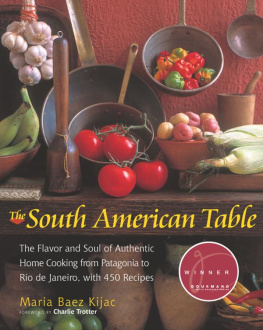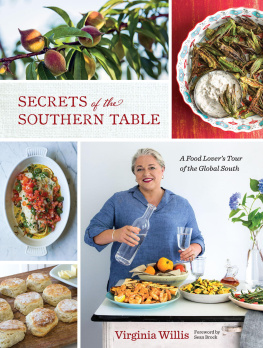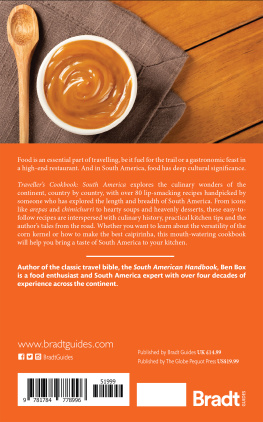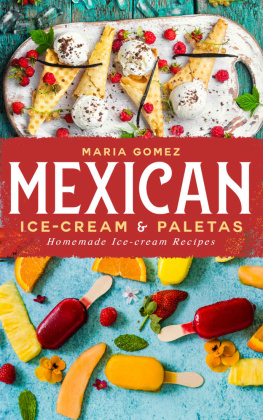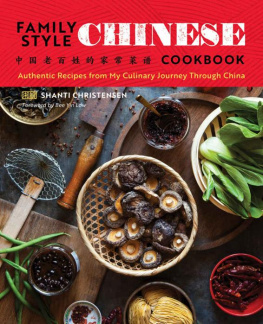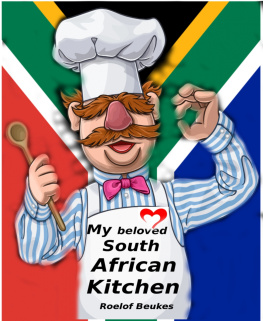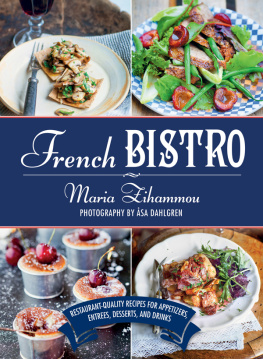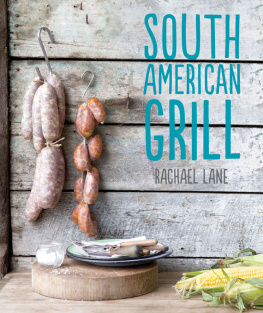The Harvard Common Press
535 Albany Street
Boston, Massachusetts 02118
www.harvardcommonpress.com
Copyright 2003 by Maria Baez Kijac
All rights reserved. No part of this publication may be reproduced or transmitted in any form or by any means, electronic or mechanical, including photocopying, recording, or any information storage or retrieval system, without permission in writing from the publisher.
P RINTED IN THE U NITED S TATES OF A MERICA
P RINTED ON ACID-FREE PAPER
L IBRARY OF C ONGRESS C ATALOGING-IN -P UBLICATION D ATA
Kijac, Maria Baez.
The South American table : the flavor and soul of authentic home cooking from Patagonia to Rio de Janeiro, with 450 recipes / Maria Baez Kijac.
p. cm.
Includes bibliographical references and index.
ISBN 1-55832-248-5 (hc : alk. paper)ISBN 1-55832-249-3 (pbk : alk. paper)
1. Cookery, Latin American. 2. CookerySouth America. 3. South AmericaSocial life and customs. I. Title.
TX716.A1K55 2003
641.598dc21
2003011100
ISBN: 978-1-55832-249-3
Special bulk-order discounts are available on this and other Harvard Common Press books. Companies and organizations may purchase books for premiums or resale, or may arrange a custom edition, by contacting the Marketing Director at the address above.
Cover design by Night & Day Design
Cover photograph by Alexandra Grablewski
Interior design by Richard Oriolo
10 9 8 7 6 5 4 3
TO MY DECEASED PARENTS ,
ALONSO BEZ CHVEZ AND MARA LUISA CARRERA DE BEZ ,
WHO TAUGHT ME THE VALUES THAT MADE ME
THE PERSON I AM TODAY
AND TO MY DECEASED HUSBAND ,
PETER KIJAC, WHO HAS BEEN THE INSPIRATION
FOR THIS BOOK
Foreword
A S EAGER COOKS AND GOURMETS around the United States seek to learn ever more about cuisines from around the world, there is one area in particular that remains largely untappedthe foods of South America. Maria Baez Kijac goes a long way in remedying that problem for us with the publication of The South American Table. This glorious work is a literal love note to the beauties and pleasures of the foods of South America. The pages within are absolutely packed with history, geography, anecdotes, and, of course, tremendous recipes. Each preparation is introduced with pertinent cooking information or an insightful story that makes the actual preparation of the dish just that much more special.
In my own cuisine, I covet ideas from around the world, and I can enthusiastically say that I have thoroughly mined these pages and discovered many gems. The Sopa de Quinua con Chancho (Quinoa Soup with Pork), for example, is a preparation that is simultaneously exotic and earthy, with the elegant flavors of cumin and annatto subtly perfuming the dish. Also, the Calabi Matutero (Chicken with Okra and Cabbage), which was originally made with goat, is extremely light and delicate, yet it has tremendous depth of flavor. Additionally, I'm quite fond of the Librillo en Salsa Mani (Tripe in Peanut Sauce). This unique preparation, with its satiny peanut essence, will forever change the way you think about tripe. And for sheer sensual delight, go straight for the Cuscuz de Tapioca (Tapioca and Coconut Cake). You will be sneaking bites of this when no one is looking.
Best of all, this book contains exclusively recipes that are straightforward and unintim-idating, approachable for any level of experience in the kitchen. Plus, you will discover, as I have, that the foods of South America are quite healthy, relying on fresh seasonal produce and deemphasizing the use of cream and butter. Furthermore, if The South American Table whets your appetite to learn more, then you can refer to the stunningly extensive bibliography in the rear of the book. One's appreciation for the utter depth of information contained here will grow with each visit into these pages. We all owe Maria Baez Kijac a hearty salutation of "Three cheers!" for her prodigious accomplishment, for with The South American Table, she has delivered a masterpiece.
Charlie Trotter
Acknowledgments
T HE SOUTH AMERICAN TABLEWOULD not have been possible without my husband's encouragement and belief that I should write this book. His passion for excellence in food and scholarship made him a wonderful partner, and his collaboration was invaluable. After he passed on, my daughters, Patty, Carol, and Stephanie, took over, and it was their love and encouragement that made me continue with the book. The last few months of finishing The South American Table were made easier with their helptesting, editing, and doing anything that was needed to make my job less difficult. I will be forever grateful to them for taking time off from their busy lives to help me.
During my 15 years of research, many wonderful and generous people in North and South America have touched this book in so many ways. I will always remember with fondness the years I belonged to gourmet and cooking groups on the North Shore of Chicago. These groups provided me with an outlet for my growing curiosity about the cuisines of the world. At the time, I didn't realize that these experiences would be vital to my understanding of the South American table. There wasn't a food, no matter how complicated, that we wouldn't dare to tackle. It was with these groups that I first encountered the Brazilian feijoada, and I'll never forget our first attempt to make chocolates. While we prepared wonderful dinners from around the world, we also got together to make jelly, candy, and hors d'oeuvres. These memories will remain with me forever. However, the most important thing I made was friends: Ann Hill and Dave Gutkneth, Connie and Jack Kindswater, Janet and Joe MacGowen, Elaine and Hoyt Matthews, Susan and Dave Spears, Lois and Harrison Steans, Jessica and Ron Tesarik, and Lynn and Mike Zarimba.
When I started this project, the biggest challenge I had was finding sources for good recipes. South American cookbooks were hard to come by, but it was amazing that soon after I began, my family and friends were able to provide me with an enormous amount of resources. As many of them traveled throughout South America, they sent me books and recipes from the countries they visited. My special thanks go to my sisters, Fina Waterston and Ximena Bez, and my brother Polo Bez for providing me with books and with recipes they collected from friends. They were always ready to help with whatever kind of research I needed.
All of us who use the computer for writing books know how much we depend on it. After my husband's death, I found myself lost around the computer. Debbie Allen was the angel who came to my rescue. It was Debbie, with her incredible patience and understanding, who made me lose my fear of the computer. She quickly anticipated my needs and set up directories and everything else needed to complete this book. She was always ready to guide me whenever I needed help. Debbie, I will be forever grateful for your help.
After Debbie moved to California, my brother Edgar Bez and my son-in-law Tim Shanahan took over, installing software, teaching me how to use a new computer, and coming to fix whatever needed fixing. I don't know how I could have finished this book without their help.
I would also like to thank some special friends, whom I consider my extended family: June and Bob Doench, Chris and Jim Miller, and Jane and Ted Schulte. They have encouraged me and given me their support, especially after my husband's death. Their love and care pulled me through some very difficult times. They will always have a special place in my heart.
When I think back and remember the times I wanted to give up on the project, I had some other friends who reminded me of the importance of sharing my culture and the treasures of the South American table. These people include Henry and Millie Rucker, Dr. Julia Gorelik, and Dr. Pieter Van Heule. My deepest thanks go to each of them.
Next page
